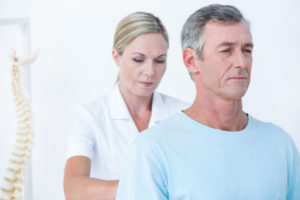What is a disc herniation?
A herniated disc in the lumbar spine arises when a disc bulges or herniates and/or the gel pad that separates the 5 lumbar vertebral bones ruptures or collapses allowing the vertebrae to rub against each other or compress a nerve or a nerve root. Disc herniations can occur at all levels of the spine, including the cervical and thoracic spine, which may produce symptoms in the arms and hands.
Symptoms of a disc herniation in the lumbar spine
- Dull or sharp lower back pain
- Muscle spasm, cramping
- Pain that often radiates all the way to the lower leg and foot along an anatomical path
- Weakness in a leg or loss of leg function
- Difficulty bending which usually intensifies the pain.
What is the disc in disc herniation?
The disc or gel pad is a tough fibrous shock-absorbing pad filled with a gel like nucleus (Pulposus). The shape and anatomy of vertebral bones hold these discs in place. The anatomy of a disc is sometimes compared to a grape with a harder outer surface and a softer gel like substance inside.
What happens with a disc herniation?
Nerves branch off along your spine and connect to various parts of your body to help you sense and move. The nerves pass through passageways or channels between the vertebrae and discs. When the disc herniates or bulges, or the disc actually ruptures and the gel like substance escapes, it can compress the spinal cord or the spinal nerve roots resulting in pain and suffering and sciatica; it can even result in completely losing the nerve functions to the point where you are unable to move a leg.
What causes a disc herniation?
The above condition arises when the lumbar spinal area experiences undue pressure or the pads are subjected to a pinched-condition from the shifted vertebrae; this can happen from:
- A shock of an accident
- Undue movement while exerting pressure on the spine
- Continuous posture in the same position for extended periods of time.
- Poor posture with an incorrect body movement that stresses the lumbar spine and affects its normal ability to carry body weight or help with movement.
- Lifting something incorrectly placing an enormous amount of pressure at pinch points and herniating or even rupturing the disc.
- Degenerative conditions like osteoarthritis, resulting in disc space narrowing and/or the formation of abnormal boney growths (osteophytes)
You may be eligible for compensation?
In most cases, these injuries are sustained when involved in a car or slip and fall accident, sporting events or poor attention to workplace health and safety. If you suspect your injury was a result of any of the above situations, you may be eligible for Long Term Disability Benefits from your insurance company or possibly workplace safety insurance benefits. Your injury could have occurred as a result of someone else’s negligence, which could have been prevented, and you may have a right to sue the at-fault party to seek compensation.
Please contact Horowitz Injury Law at 416-925-4100 for a free consultation to review your specific circumstances.
At Horowitz Injury Law, we pay special attention to our client’s needs; we closely study your insurance policy and the specific facts that have led to your injury. We work with leading experts in the fields of medicine, engineering and forensic accounting and have the resources to maximize the compensation you are entitled to receive under the law.




